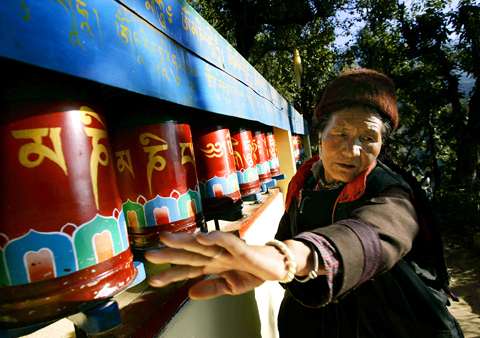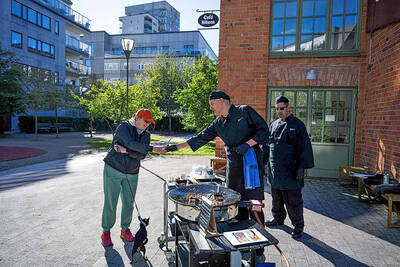Hundreds of Tibetan exile leaders debating how to advance their struggle for freedom yesterday agreed to continue to follow the Dalai Lama’s path of compromise with China, delegates said.
Tibetans from all over the world have met for six days in Dharamsala, home of the Dalai Lama and the self-declared Tibetan government-in-exile, to discuss whether to press on with a path of compromise with China — dubbed the “middle way” — or call for independence for the Himalayan region.
“The majority is supporting the middle way,” said Youdon Aukatsang, a member of the Tibetan parliament.

PHOTO: AP
She said the stance will be reviewed at some point in the future if China persists in not granting the region autonomy.
The Tibetan spiritual leader has sought substantial local autonomy for Tibet to protect its unique Buddhist culture, rather than independence from China.
The delegates “reaffirmed that they will follow the Dalai Lama in whatever path he deems most appropriate,” said Tenzin Tethong, a former prime minister of the government-in-exile.
Tethong said any decisions reached at the meeting must be approved by the Tibetan parliament, which reconvenes in March.
The delegates also recommended that Tibetan leaders stop sending delegates to meet with Chinese officials “for the time being until we are convinced China is serious about negotiating, and so far China is not serious,” said Sonamtopga, a participant in the meeting.
“We are not saying ‘end the dialogue,’ but the formal negotiations must stop now, at least until they invite us,” Aukatsang said. “We did our best and the Chinese have not responded favorably.”
A formal announcement of the meeting’s outcome was expected later yesterday.
The Dalai Lama called the meeting after publicly expressing frustration over the failure of his approach to gain greater autonomy for the region. He has declined to discuss his preference for the best strategy forward, not wanting to tilt the debate.
As a result, the meeting has been an exercise in democracy as the Tibetans tried to formulate a plan without the guidance of “His Holiness,” a man they view as closer to a god than a mere leader.
The Dalai Lama is expected to address the delegates today.
Many Tibetans said the opportunity to present their own opinions was a liberating experience that they hoped would lead to more open discussions.
“We really need to think for ourselves and be independent,” said Tenzin Nyesang of Boston. “People are being very receptive. This meeting was very peaceful.”
For its part, China has made clear that it will not yield in its hard-line approach toward Tibet.
The Dalai Lama’s “so-called ‘middle way’ is a naked expression of ‘Tibet independence’ aimed at nakedly spreading the despicable plot of opposing the tide of history,” an editorial in the official Tibet Daily newspaper said on Friday.

READINESS: According to a survey of 2,000 people, 86 percent of Swedes believe the country is worth defending in the event of a military attack Swedes are stocking up on food items in case of war, as more conflict in Europe no longer feels like a distant possibility, and authorities encourage measures to boost readiness. At a civil preparedness fair in southwest Stockholm, 71-year-old Sirkka Petrykowska said that she is taking the prospect of hostilities seriously and preparing as much as she can. “I have bought a camping stove. I have taken a course on preservation in an old-fashioned way, where you can preserve vegetables, meat and fruit that lasts for 30 years without a refrigerator,” Petrykowska said. “I’ve set aside blankets for warmth, I

FRUSTRATIONS: One in seven youths in China and Indonesia are unemployed, and many in the region are stuck in low-productivity jobs, the World Bank said Young people across Asia are struggling to find good jobs, with many stuck in low-productivity work that the World Bank said could strain social stability as frustrations fuel a global wave of youth-led protests. The bank highlighted a persistent gap between younger and more experienced workers across several Asian economies in a regional economic update released yesterday, noting that one in seven young people in China and Indonesia are unemployed. The share of people now vulnerable to falling into poverty is now larger than the middle class in most countries, it said. “The employment rate is generally high, but the young struggle to

ENERGY SHIFT: A report by Ember suggests it is possible for the world to wean off polluting sources of power, such as coal and gas, even as demand for electricity surges Worldwide solar and wind power generation has outpaced electricity demand this year, and for the first time on record, renewable energies combined generated more power than coal, a new analysis said. Global solar generation grew by a record 31 percent in the first half of the year, while wind generation grew 7.7 percent, according to the report by the energy think tank Ember, which was released after midnight yesterday. Solar and wind generation combined grew by more than 400 terawatt hours, which was more than the increase in overall global demand during the same period, it said. The findings suggest it is

‘ARMED CONFLICT’: At least 21 people have died in such US attacks, while experts say the summary killings are illegal even if they target confirmed narcotics traffickers US forces on Friday carried out a strike on an alleged drug-smuggling boat off the coast of Venezuela, killing four people, US Secretary of Defense Pete Hegseth said. The latest strike, which Hegseth announced in a post on X, brings the number of such US attacks to at least four, leaving at least 21 people dead. An accompanying video shared by Hegseth showed a boat speeding across the waves before being engulfed in smoke and flames. “Four male narco-terrorists aboard the vessel were killed,” the Pentagon chief wrote. He said the strike “was conducted in international waters just off the